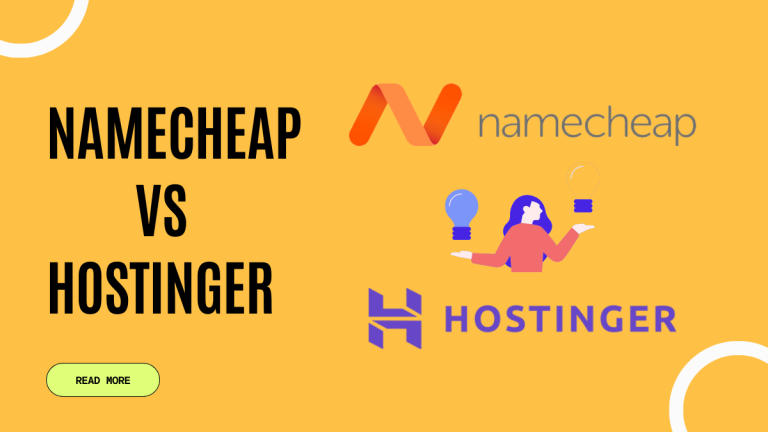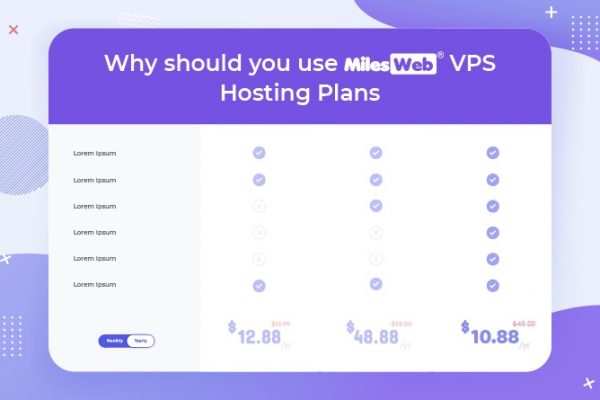In today’s digital world, having a website is essential for businesses and individuals alike. Web hosting services provide the infrastructure and tools needed to host a website and make it accessible to the world.
In this article, we’ll compare two popular domain with web hosting platforms, Namecheap and Hostinger, to help you make an informed decision on which one to choose.
Namecheap was founded in 2000 and has become a leading domain registrar and web hosting provider, with over 16 million customers worldwide. Hostinger, on the other hand, was founded in 2011 and has grown into one of the largest web hosting companies in the world, with over 29 million users across 178 countries.
1. Features
When it comes to web hosting services, the features offered can make all the difference in the experience you have with your website. Namecheap and Hostinger offer a range of hosting services, including shared hosting, WordPress hosting, VPS hosting, dedicated servers, website builders, and domain registration services.
Shared Hosting:
Shared hosting is a type of web hosting where multiple websites share a single server. Both Namecheap and Hostinger offer shared hosting plans, which are ideal for students, individuals and small businesses that are just starting out with their online presence.
Namecheap offers three shared hosting plans: Stellar, Stellar Plus, and Stellar Business.
Web Hosting Hostinger, on the other hand, also offers three shared hosting plans: Single, Premium and Business. Both companies offer unlimited bandwidth, but Hostinger offers a higher storage capacity on its plans.

WordPress Hosting:
WordPress is one of the most popular website platforms, and both Namecheap and Hostinger offer web hosting for wordpress hosting plans. These plans are specifically designed for WordPress websites, offering features such as pre-installed WordPress, automatic updates, and optimized performance.
Namecheap offers three WordPress hosting plans: EasyWP Starter, EasyWP Turbo, and EasyWP Supersonic.
Hostinger offers four WordPress hosting plans: Single, Starter, Business, and WordPress Pro plan.
VPS Hosting:
VPS hosting is a type of web hosting where a virtual private server is created on a physical server, giving users greater control and flexibility over their hosting environment. Both Namecheap and Hostinger offer VPS hosting plans.
Namecheap offers three VPS hosting plans: Pulsar, Quasar, and Magnetar.
Hostinger offers eight VPS hosting plans: VPS 1, VPS 2, VPS 3, 3vCPU and up to VPS 8. Hostinger also offers custom VPS hosting plans, giving users more control over their server resources.
Dedicated Servers:
Dedicated servers are physical servers that are dedicated to a single user or organization. They offer the highest level of performance, security, and control, but are also the most expensive type of hosting. Namecheap offers dedicated server hosting plans but Hostinger does not.
Namecheap offers six dedicated server plans: Xeon E3-1230 v5, Xeon E-2236, Xeon E-2276G, Dual Xeon Silver 4310T and others.
Website Builders
Both Namecheap and Hostinger offer website builders that allow users to easily create and customize websites without any coding knowledge. Namecheap’s website builder is called “Easy Website Builder” and is included in all shared hosting plans.
Hostinger’s website builder is called “Zyro” and is available as a standalone product or included in some shared hosting plans.
Advantages of Cloud Hosting over Traditional Shared Hosting:
Cloud hosting is a type of hosting that uses a network of servers to host websites, rather than a single server. This results in greater reliability, scalability, and performance compared to traditional shared hosting. Both Namecheap and Hostinger offer cloud hosting plans, which are ideal for larger websites or websites that receive a lot of traffic.
Domain Registration Services:
Both Namecheap and Hostinger offer domain registration services, allowing users to purchase and manage domain names for their websites. Namecheap is known for its affordable domain registration prices, while Hostinger offers a free domain name with some of its hosting plans.
Namecheap domain with .COM is available for only $5.98 and hostinger provides .com domain for $0.99.
In summary, both Namecheap and Hostinger offer a range of web hosting services including shared hosting, WordPress hosting, VPS hosting, dedicated servers, website builders, and domain registration services. Namecheap’s plans are more traditional, while Hostinger focuses on cloud hosting.
Both companies have their advantages in terms of features, with Namecheap offering more diverse options and Hostinger providing more advanced features for those who need more power and flexibility. Ultimately, the choice between the two will depend on the specific needs of the user.
2. Performance
Website performance is a crucial aspect to consider when choosing a web host. A website that is slow to load or frequently experiences downtime can negatively impact user experience and search engine rankings. Therefore, it’s important to compare the infrastructure and technologies used by Namecheap and Hostinger.
Namecheap utilizes data centers located in the US and UK, while Hostinger has data centers in several locations worldwide, including the US, UK, Brazil, Netherlands, Singapore, and Indonesia. Both companies offer 99.9% uptime guarantees, but Hostinger has a slightly better record in terms of uptime.
Both Namecheap and Hostinger use SSD storage, which is faster and more reliable than traditional HDD storage. However, Hostinger’s SSDs are more advanced, using a technology called Intel Optane, which offers even faster speeds and improved endurance.
In terms of server software, Namecheap and Hostinger both use the popular cPanel control panel, which offers a user-friendly interface for managing websites and hosting accounts. Hostinger also offers a custom control panel called hPanel, which some users may prefer.
Overall, both Namecheap and Hostinger offer reliable performance and use modern technologies to ensure fast website speeds and minimal downtime. However, Hostinger’s use of Intel Optane SSDs and its global network of data centers may give it a slight edge over Namecheap in terms of performance.
cPanel vs hPanel
Namecheap offers cPanel as its primary control panel for shared hosting, reseller hosting, and VPS hosting plans. cPanel is a popular and user-friendly control panel that provides a wide range of features and tools for managing your website and server. It has a user-friendly interface that allows you to easily manage your website files, databases, email accounts, domains, and more. With cPanel, you can also install popular website applications such as WordPress, Joomla, and Drupal with just a few clicks.
On the other hand, Hostinger offers hPanel as its custom-built control panel for managing websites, domains, and hosting accounts. hPanel is designed to be simple, intuitive, and easy to use, even for beginners. It has a clean and modern interface that allows you to manage your website files, domains, email accounts, and more. With hPanel, you can also install popular website applications such as WordPress, Joomla, and Drupal with just a few clicks.

One advantage of hPanel is that it is specifically optimized for Hostinger’s hosting environment. This means that it may offer faster and more reliable performance compared to cPanel, which is a third-party control panel. Additionally, hPanel includes some unique features such as an AI-powered website builder, custom email templates, and a website feedback tool.
Overall, both cPanel and hPanel are user-friendly and offer a wide range of features for managing your website and hosting account. Which one you choose may depend on your personal preference and the specific hosting plan you select.
3. Pricing
When it comes to choosing a web hosting provider, pricing is one of the most important factors to consider. In this section, we will compare the pricing structures of Namecheap and Hostinger, and explore the various cost considerations you should keep in mind.
Comparison of Pricing Structures
Namecheap and Hostinger offer similar hosting plans, but there are some differences in their pricing structures.
Namecheap offers three shared hosting plans: Stellar, Stellar Plus, and Stellar Business. These plans start at $1.58 per month for the first year and renew at $4.48 per month for the Stellar plan, $2.28 per month for the Stellar Plus plan, and $4.48 per month for the Stellar Business plan. Namecheap also offers WordPress hosting plans, starting at $34.88 per year for the first year, and renewing at $48.88 per month. Additionally, they offer VPS hosting, starting at $6.88 per month, and dedicated server hosting, starting at $48.88 per month.
Hostinger offers three shared hosting plans: Single, Premium, and Business. These plans start at $1.99 per month for the Single plan, $2.99 per month for the Premium plan, and $3.99 per month for the Business plan. Hostinger also offers WordPress hosting plans, starting at $1.99 per month, and renewing at $3.99 per month. They offer VPS hosting plans, starting at $3.99 per month, and cloud hosting plans, starting at $9.99 per month.
Importance of Renewal Prices and Long-Term Cost Considerations
When choosing a web hosting provider, it’s important to consider the renewal prices, as they can often be much higher than the introductory prices. Namecheap’s renewal prices are slightly higher than Hostinger’s for shared hosting and WordPress hosting plans, but their VPS and dedicated server hosting plans are generally more expensive. Both providers offer discounts for longer-term contracts, which can help you save money in the long run.
Discounts and Promotions
Both Namecheap and Hostinger frequently offer discounts and promotions on their hosting plans. Namecheap often offers sales on domain registrations, while Hostinger regularly offers discounts on their hosting plans. It’s worth keeping an eye on their websites for any current promotions that might save you money.
Overall, Hostinger’s pricing is generally lower than Namecheap’s, but Namecheap offers more robust VPS and dedicated server hosting options. When considering which provider to choose, it’s important to weigh the cost considerations against the specific features and needs of your website.
4. Customer Support
Customer support is a critical aspect of web hosting services. In this section, we will compare the customer support options provided by Namecheap and Hostinger and evaluate their quality.
Namecheap offers customer support through live chat and a ticketing system. Phone support is available for dedicated server customers. The live chat option is available 24/7, and the ticketing system guarantees a response within 24 hours. Namecheap also has a comprehensive knowledge base and a community forum.
Hostinger provides customer support through live chat, email, and a knowledge base. Phone support is not available. Hostinger’s live chat option is available 24/7, and the response time is less than a minute. Hostinger’s knowledge base is well-organized and covers a wide range of topics.
Customers’ feedback on customer support quality is generally positive for both Namecheap and Hostinger. Customers appreciate the promptness and helpfulness of the support teams.
Conclusion
In conclusion, both Namecheap and Hostinger offer a range of hosting services with their own unique features and benefits. When considering which provider to choose, it’s important to carefully evaluate your needs and consider factors such as performance, pricing, and customer support.
In terms of features, both Namecheap and Hostinger offer a variety of hosting options such as shared hosting, WordPress hosting, VPS hosting, dedicated servers, website builders, and domain registration services. Hostinger also provides the advantage of cloud hosting, which can offer better performance and scalability compared to traditional shared hosting.
When it comes to performance, both companies use modern infrastructure and technologies to provide reliable uptime and fast website speeds. Namecheap provides an uptime guarantee of 99.9%, while Hostinger offers a 99.99% uptime guarantee and SSD storage.
Pricing is another important factor to consider, and both Namecheap and Hostinger offer competitive pricing structures with different plans to suit different needs. It’s important to pay attention to renewal prices and long-term costs when making a decision.
Lastly, customer support is crucial when it comes to web hosting, and both companies offer various support options such as live chat, email, and knowledge base articles. Hostinger also provides phone support, which can be beneficial for those who prefer to speak to a representative directly. It’s also helpful to read reviews and feedback from customers to gauge the quality of support.
Overall, both Namecheap and Hostinger are reputable and reliable web hosting providers with their own strengths and weaknesses. Choosing between them ultimately comes down to individual needs and preferences. However, based on our comparison, Hostinger may be a better choice for those who value cloud hosting and phone support, while Namecheap could be a better fit for those who prefer a wider range of hosting options and a more established brand.







